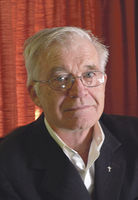 There are two films that I’ve seen lately that have made me really think. They are on dvd and I knew nothing about them when they arrived at my friends’ place.
There are two films that I’ve seen lately that have made me really think. They are on dvd and I knew nothing about them when they arrived at my friends’ place.
The first was called My Father’s Glory. It is in French and set in France at the beginning of the 20th century. The boy narrator tells the true story of his father.
Now remember, this is the first half of last century so France has its fair share of suffering (particularly during a long and bloody 1914-1918 war against Germany and its allies) and the boy doesn’t hide it.
But what a joy this boy shows in his father and in the simple life of rural France full of the wonders of growing up.
A week later the second film turns up. I don’t pick the films, I just sit and watch them on TV. It turns out to be part II of the same series: My Mother’s Castle.
This time our lad is telling the story of his mother. The events that France has to face are the same of course but again he is full of the joys of his mother and those that surround her.
Again the film goes through the ups and downs of life including his mother’s untimely death and that of his best friend in the trenches. But the joy he has in her and his friends never falters and at the end we feel that we have lived her life with its joy and satisfaction in a mysterious way.
The films were of the autobiography of noted French author Marcel Pagnol and what an outlook his parents must have given him. They are fairly academic but their love of the country and their feats to become part of it are memorable. He doesn’t dwell on the sad bits and you can feel the enormous satisfaction in the parents and the countryside grows on you as the two films progress.
At around the same time I came upon a set of audio cassettes I bought in the 1980s. I didn’t really recall their content, I just had a hunger to hear them again. Called A Fortunate Life, they were made by the ABC in the early 1980s and tell the story of A B Facey who lived in much the same time as Marcel Pagnol.
The story is set in Western Australia and narrated in the author’s voice. When the tapes starts it’s hard to believe that his life is fortunate because he is moved about among relations, doesn’t get a chance for education; he is cruelly horsewhipped and serves his country in the First Wold War under horrendous conditions before meeting his wife and settling down a little.
Even his later life is fraught with difficulty. But this is also blessed with an amazing marriage and the goodness of the couple shines out of their children.
He never seems to feel sorry for himself and he has an enormously forgiving nature. The bad things are simply dealt with as they happen. The constant shifting around, especially in the early days, just seems to be accepted as part of the given. As an old man, his telling of his story and the ownership he has of it, really tells of a Fortunate Life.
My reflection on these stories was enhanced by a trip to Blenheim for a family wedding. I really enjoyed myself despite my obvious difficulties and I thought of the choice I was making.
I could have stayed home because getting to the wedding was too complicated or I could take a chance and see what would happen. I’m glad I went and the small crosses I had to overcome were nothing compared to the joy of being with family – just like the films and audio cassettes.